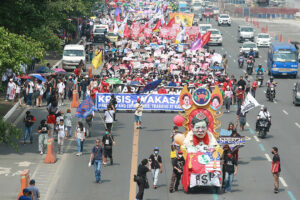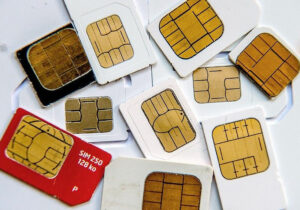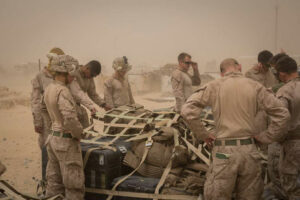That ‘piece of paper’

The International Observer Mission that monitored the May 9 election claims that it was neither free, fair, nor honest. But if it was, with over 31 million votes in his favor, or some 56% of the votes cast, Ferdinand Marcos, Jr. won the Presidency by an unprecedented landslide.
That would make him the most popular of all the candidates last May. Only 25 days into his six-year term of office last Monday, he therefore had nothing — or little — to fear from his countrymen and women.
But nearly 22,000 police personnel, plus some 8,000 more from the Presidential Security Group (PSG), the Bureau of Fire Protection, the Philippine Coast Guard, the Metropolitan Manila Development Authority, and even the Bureau of Jail Management and Penology were deployed to secure Mr. Marcos Jr. and his family during his first State of the Nation Address (SONA) last Monday, July 25.
The Philippine National Police (PNP) also banned protest actions such as rallies and demonstrations in several streets including Manila’s Mendiola, despite its being kilometers away from the Batasang Pambansa where he delivered his first SONA.
Those attending the SONA were also told not to wear anything with a political statement on it, which was of course in violation of the right to free expression mandated by the Constitution. And only when the PNP realized that there would be pro-Marcos gatherings too did they agree with the Quezon City government to allow protesters on Commonwealth Avenue.
Local government units, not the police, have the authority to approve or deny applications for permits to hold public gatherings. But usually ignored is the more basic fact that permits are required only to forewarn local authorities early enough for them to reroute traffic and assure the safety of the public. Instead, however, in violation of Article III, Section 4 of the Constitution, permits are often either granted or denied on the basis of whether the group involved is perceived to be pro- or anti-government.
Those groups initially denied permits were obviously thought to be in the latter category, thus the police’s earlier insistence in denying them their right to protest and bring their grievances to government attention.
These excessive measures made it appear that Mr. Marcos Jr. is as unpopular as, say, Australian politician Clive Palmer, who has a dismal -51% approval rating, or the United Kingdom’s former Prime Minister Boris Johnson, whose disapproval rating was 70% at the time of his resignation.
Granted that because it puts the Executive and Legislative branches of government together in one venue, every President’s SONA needs extra attention in terms of those participants’ and attendees’ safety. But does doing that really need almost two divisions of armed men for it to succeed, especially since the PSG themselves said that they knew of no threat against the person of Mr. Marcos or of anyone else in government?
Benigno Aquino III’s security people apparently did not think that such a huge army was needed in 2015, and neither did Rodrigo Duterte’s last year. The late Mr. Aquino’s last SONA was secured by 10,000 police and military personnel, while 7,000 did the same for Mr. Duterte’s 2021 SONA. In neither case were protests banned, except in the immediate vicinity of the Batasan.
The measures the new administration took to secure Mr. Marcos Jr. and his family — those measures were certainly adopted primarily for that purpose — do not only raise eyebrows. They also provoke such questions as:
1.) Are they indicative of the same reliance on the coercive powers of the State that characterized Marcos Sr.’s rule?
2.) Given how, this early, restrictions on free expression and the right to peaceable assembly are being implemented, is this a portent of things to come? and,
3) Is the new Marcos regime thus replicating the anti-free expression and other repressive policies of its predecessor?
The fears implicit in these questions are far from unfounded. There is, after all, a context in which the use of coercion as the primary policy in dealing with dissent occurred: during the martial law period which, despite the Marcos family’s efforts at prettifying it, is nevertheless still equated with repression by many Filipinos including those too young to have lived through it, but whose elders have told them about it.
Question No. 3 is equally relevant. These are not exactly the best of times for the exercise of free speech, free expression, and press freedom. All had been diminished — or, to borrow the word the Constitution uses in Article III, Section 4, “abridged”— during the six years of the Duterte despotism through such attacks on media organizations as withdrawing their registrations and shutting them down, encouraging the filing of libel suits against journalists, blocking access to their websites, and “red-tagging” and barring reporters from covering Malacañang. Equally restrictive and in some instances even lethal for those targeted was the regime’s labeling as terrorists sectoral groups such as teachers’, students’, workers’, youth, and women’s organizations, and even religious charities, book stores, and entire universities.
The Duterte regime was as dependent on the police and military as the Marcos dictatorship. Its response to the COVID-19 pandemic was grossly militarized and like its failed “war on drugs,” as deadly to such fundamental rights as those to life and due process. As a consequence — the Bill of Rights is the heart of that document — only with some exaggeration did the Constitution become no more than the “piece of paper” the power elite reduced it to. Together with its frequent violations and the perception that it is of no consequence to Filipino lives and fortunes came the country’s descent into even worse poverty, political and social instability, and hopelessness.
His first SONA, as announced earlier, did focus on Mr. Marcos Jr.’s economic recovery program; his plans to improve the government’s capacity to help the underprivileged; revive the tourism industry; develop alternative energy sources; reform the healthcare and educational systems; and support agriculture and farmers, among others. He also vowed never to surrender “even an inch” of Philippine territory to any foreign power.
But although insulated by the police and military from the grievances of protesters, he could have also dwelt on the need for any administration with democratic pretensions to make the Constitution more than the veritable piece of paper into which it has been reduced by the past regime. He could have assured the press of State protection of its freedom as a necessary pillar of democratic rule, together with free speech, free expression —and, yes, re-affirmed the citizenry’s right “peaceably to assemble and petition the government for the redress of grievances.”
That he did not, one can only hope, was not indicative of any policy that would continue rather than end his predecessor’s war against democratic rights and the Constitution. That would be to the detriment of the unity and national recovery of which Mr. Marcos Jr. claims to be both herald and champion.
Rather than just a document worth only the paper it is written on, the 1987 Constitution restored such democratic institutions as the elections that put Mr. Marcos Jr. in power, and bound the Filipino community together in a new social contract with government.
It is the government’s primary responsibility to defend the Constitution as the guardian and guarantor of the people’s and this country’s freedom, welfare, and development. The past regime reneged on that responsibility. May the present one be more than aware of the need to respect, honor, and, most of all, abide by it.
Luis V. Teodoro is on Facebook and Twitter (@luisteodoro).




